 Petzlover
Petzlover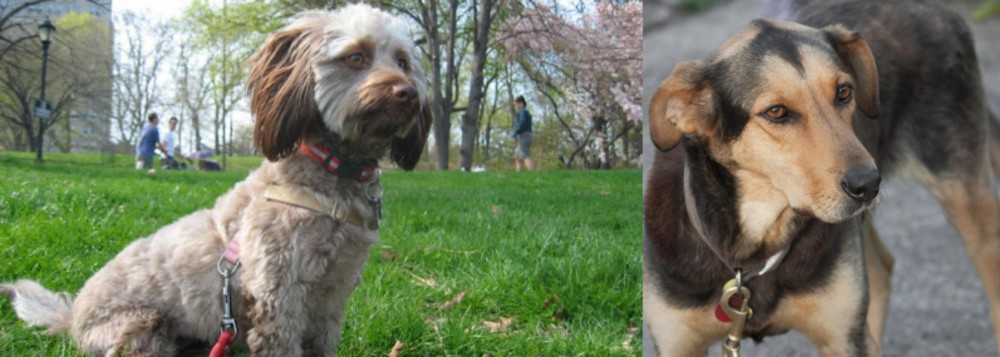 Doxiepoo is originated from United States but Huntaway is originated from New Zealand. Doxiepoo may grow 41 cm / 16 inches shorter than Huntaway. Doxiepoo may weigh 39 kg / 85 pounds lesser than Huntaway. Both Doxiepoo and Huntaway has almost same life span. Both Doxiepoo and Huntaway has almost same litter size. Doxiepoo requires Moderate Maintenance. But Huntaway requires Low Maintenance
Doxiepoo is originated from United States but Huntaway is originated from New Zealand. Doxiepoo may grow 41 cm / 16 inches shorter than Huntaway. Doxiepoo may weigh 39 kg / 85 pounds lesser than Huntaway. Both Doxiepoo and Huntaway has almost same life span. Both Doxiepoo and Huntaway has almost same litter size. Doxiepoo requires Moderate Maintenance. But Huntaway requires Low Maintenance
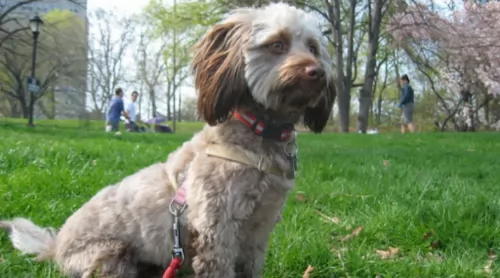 The Doxiepoo is a designer dog breed - a combination of the Dachshund who was used to hunt for Badgers and the Poodle, a dog bred in France to essentially be a lap dog. There is however some dispute as to whether the Poodle descends from Germany or from the French Barbet.
The Doxiepoo is a designer dog breed - a combination of the Dachshund who was used to hunt for Badgers and the Poodle, a dog bred in France to essentially be a lap dog. There is however some dispute as to whether the Poodle descends from Germany or from the French Barbet.
Wherever the parents hail from, the Doxiepoo hails from the United States of America.
With both the Poodle and the Dachshund being intelligent, fun and loving type of canines, the two of them together have brought out a wonderful hybrid pet in the Doxiepoo. Today, the Doxiepoo is bred with other Doxiepoos.
 The Huntaway or New Zealand Huntaway is a herding dog that originated in the New Zealand sheep country. Their main purpose is to drive sheep and they are not an old breed. They were developed late in the 19th century for their working skills. The only real criteria was that they were black and tan. A dog must win a trial in order to be placed in the New Zealand Sheep Dog Trial Association studbook. They drive sheep mainly through their deep, loud voice.
The Huntaway or New Zealand Huntaway is a herding dog that originated in the New Zealand sheep country. Their main purpose is to drive sheep and they are not an old breed. They were developed late in the 19th century for their working skills. The only real criteria was that they were black and tan. A dog must win a trial in order to be placed in the New Zealand Sheep Dog Trial Association studbook. They drive sheep mainly through their deep, loud voice.
In the New Zealand high country there was a need for a working dog with stamina, agility and intelligence to work the sheep as a drover (herder). The dog had to be able to handle rough, steep land and work with very large groups of sheep. The sheer area of land that the sheep graze and the dog would have to cover, demanded that this dog have stamina and strength to cover large pasture land and work for days if necessary. Before this the shepherds had used British sheepdogs but they preferred dogs that barked while working. So they bred the British Sheepdogs with Collies, Border Collies, Labrador, Rottweiler, Doberman and other barking sheepdogs to create the Huntaway. In addition to the bark, they bred for stamina and size.
They were participating in field trails in 1870 and ads for them were seen in newspapers by 1884. They became a separate breed in the 20th century. Today they are spreading around the world and are becoming very popular. It is not recommended that they be kept as pets however, since they are true working dogs.
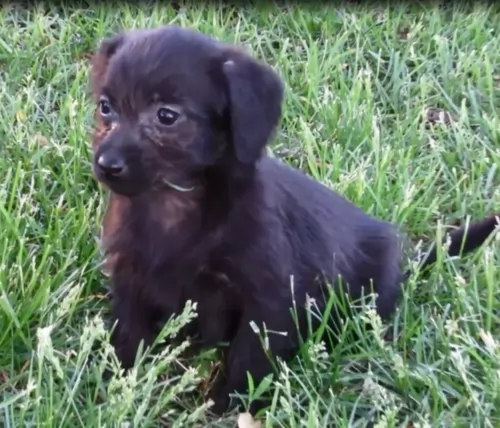 The Doxiepoo can range from being a small to medium sized dog, standing at anything between 20cm to 25cm in size and weighing between 3kg and 7kg, depending much on whether a standard, miniature or toy sized poodle was used in the breeding.
The Doxiepoo can range from being a small to medium sized dog, standing at anything between 20cm to 25cm in size and weighing between 3kg and 7kg, depending much on whether a standard, miniature or toy sized poodle was used in the breeding.
The Doxiepoo could look like either one of the two breeds, but he will have a strong, sturdy body with a curly or wavy coat of varying lengths and various colors - cream, black, tan, apricot, grey or white. The poodle side of him ensures he is a hypoallergenic dog.
Between the Dachshund and the Poodle, you’re going to get a wonderful array of characteristics as they both come with their strong points. Certainly you will be well entertained and amused by your pet, while he can also be useful as a watchdog.
Being a small dog, he will fit well into life in the city or in the countryside. He is as bright as a button and learns tricks and new skills quickly. With training and socialization he becomes obedient and well behaved wherever he is, getting on well with other pets in the home as well as with all children and adults.
The Doxiepoo is a lively, alert, energetic dog and will require being exercised – lots of ball games and a walk will keep him lean, muscular and content.
 The Huntaway is a large dog with a deep chest and a black and tan coat. They are strong, big and muscular with voices to match. They herd, head, work the sheep in pastures and force them into pens. They are bred to have that big authoritative, deep bark. They do not yap. Their bodies are well proportioned but longer than high. They have well - padded feet and a deep chest for stamina, along with strong legs and body that allows them to run fast and change directions at will.
The Huntaway is a large dog with a deep chest and a black and tan coat. They are strong, big and muscular with voices to match. They herd, head, work the sheep in pastures and force them into pens. They are bred to have that big authoritative, deep bark. They do not yap. Their bodies are well proportioned but longer than high. They have well - padded feet and a deep chest for stamina, along with strong legs and body that allows them to run fast and change directions at will.
The tail of a Huntaway if long, while their heads are shaped like blocks while the muzzle is long and the nose is black. They have dark, round eyes and long ears. An unusually attractive dog, they have dense fur with fringe on the tail and chest. There is characteristics a very large variety in the in the way the breed looks from one dog to the next. Thus they do not participate in confirmation events, as the standard is based on working characteristics rather than appearance guidelines. They are more a “class” than a “breed”.
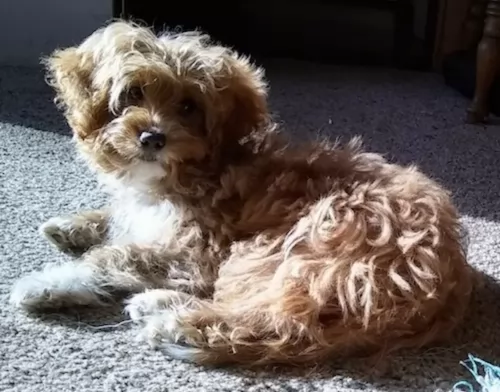 Every dog, even the little ones like this, will require some kind of input from you if you want to get the best from him. Every puppy bought as a gift when they’re cute and cuddly turns into an adult, and often the very person who received him as a gift, loses interest and neglects him. Then they wonder why the dog becomes irritating and destructive.
Every dog, even the little ones like this, will require some kind of input from you if you want to get the best from him. Every puppy bought as a gift when they’re cute and cuddly turns into an adult, and often the very person who received him as a gift, loses interest and neglects him. Then they wonder why the dog becomes irritating and destructive.
A dog is a long term investment and if you commit to your sweet Doxiepoo, you’ll get years and years of devoted friendship.
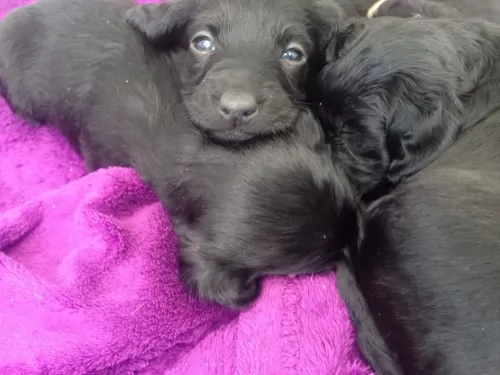 The life expectancy of the Doxiepoo is around 12-15 years of age if he is well looked after. He is a robust dog, but he can still face some health issues that both his parents contend with.
The life expectancy of the Doxiepoo is around 12-15 years of age if he is well looked after. He is a robust dog, but he can still face some health issues that both his parents contend with.
Just some of the diseases that the Doxiepoo might face while in your care are ear- and skin infections, dental disease, digestive tract problems, heart conditions and epilepsy. If you think your pet has any kind of illness, it is imperative to get him to the vet for a checkup.
Poodles, particularly are prone to skin disorders. They can be allergic to grass, parasites and food. If your Doxiepoo chews or licks his paws or some other area a lot, and the skin is red, he could have a skin allergy.
The vet will be able to diagnose your dog’s allergies with some skin- or blood testing. For instance, sebaceous adenitis is an inherited allergy that affects the lubrication of the skin and hair follicles. Symptoms of the disease include scaly skin, sore and even hair loss.
 The Huntaway is a pretty healthy breed, developed as it was from the sheepdogs and collies. They still face some inherited issues such as:
The Huntaway is a pretty healthy breed, developed as it was from the sheepdogs and collies. They still face some inherited issues such as:
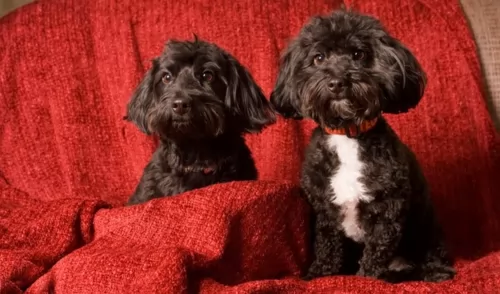 You can’t be sure what kind of coat your Doxiepoo will have but he will certainly require brushing at least twice a week. In some instances it may be wise to seek out the services of a professional groomer who does an excellent job of trimming the hair, cleaning the teeth, checking the ears and clipping the nails.
You can’t be sure what kind of coat your Doxiepoo will have but he will certainly require brushing at least twice a week. In some instances it may be wise to seek out the services of a professional groomer who does an excellent job of trimming the hair, cleaning the teeth, checking the ears and clipping the nails.
The Doxiepoo, just like any other dog, will need to be trained and socialized early as he is a stubborn dog and will need to be trained to be obedient. With this training and socialization, he becomes amicable around children and pets in the home. He learns easily too and this is what makes him a great pet for first time dog owners.
The Doxiepoo is a moderate energy dog, so he will do well on a walk every day. You can also make use of ropes, balls and frisbees to give him a bit of a workout in the garden.
He loves water too and will enjoy a run on the beach and cooling off in the ocean. He adapts easily to life in the city or in the country, so long as he is with his human companions.
The Doxiepoo will eat dry kibble, particularly if it is from the highest quality brands and chosen according to the dog’s size, age and activity levels.
Now and then you can add in a little bit of cooked rice, vegetables and chicken for variety. Some raw meat can play an important role in keeping the skin healthy and free from dryness and itchiness. Make sure that he always has fresh, cool water available to him.
 If you are not using your Huntaway to herd, then feed a medium formula not a high protein, high calorie formula. Feed 3-4 times a day and 1-2 cups.
If you are not using your Huntaway to herd, then feed a medium formula not a high protein, high calorie formula. Feed 3-4 times a day and 1-2 cups.
3 cups per day feeding twice a day high quality medium calorie food.
Exceptional stamina
This herding breed has a great need of mental and physical stimulation. They were born to herd and to do so over vast tracts of land in challenging conditions. They need to be challenged. They need daily exercise at a very high level. A Run them every day or take them on a couple of long walks. They will excel in field trials, Barnhunt, agility and rescue. They love to learn.